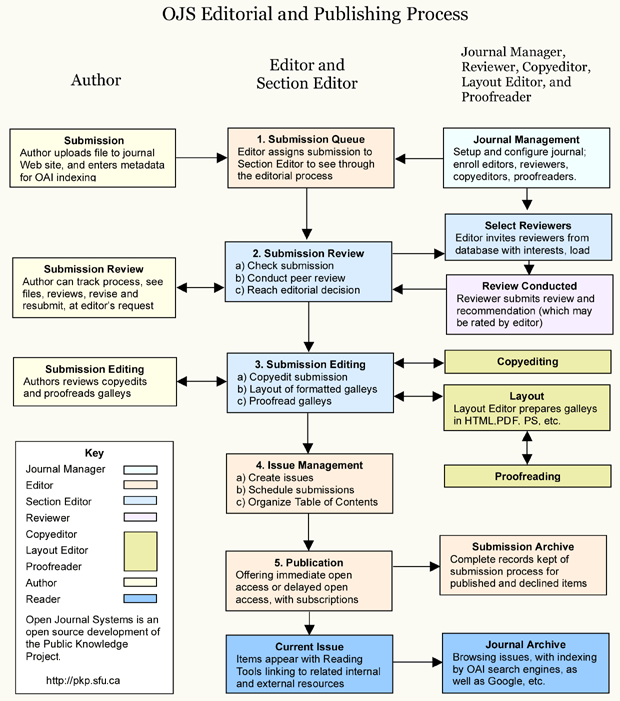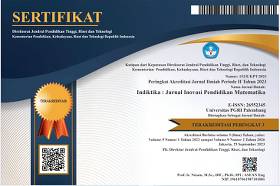About the Journal
Focus and Scope
Indiktika Journal publish scientific articles such as research and development, desain didactical research, quantitative, qualitative, experiment, correlation and regression, application of the theory, the study of critical analysis, in the field of Mathematics Education or Mathematical Science. The article submitted has not been approved and has not been accepted for publication in another journal.
Peer Review Process
Peer Review Process
Publication of articles in Indiktika : Jurnal Inovasi Pendidikan Matematika is dependent solely on scientific validity and coherence as judged by our editors and/or peer reviewers, who will also assess whether the writing is comprehensible and whether the work represents a useful contribution to the field. Indiktika : Jurnal Inovasi Pendidikan Matematika acknowledged the effort and suggestions made by its reviewers.Â
Initial evaluation of manuscripts
The Editor will first evaluate all manuscripts submitted. Although rare, yet it is entirely feasible for an exceptional manuscript to be accepted at this stage. Those rejected at this stage are insufficiently original, have serious scientific flaws, or are outside the aims and scope of the Indiktika : Jurnal Inovasi Pendidikan Matematika. Those that meet the minimum criteria are passed on to experts for review.
Type of peer review
Submitted manuscripts will generally be reviewed by experts who will be asked to evaluate whether the manuscript is scientifically sound and coherent, whether it duplicates the already published works, and whether or not the manuscript is sufficiently clear for publication. The method is blind peer review.
Decision
Reviewers advise the editor, who is responsible for the final decision to accept or reject the article. The Editors will reach a decision based on these reports and, where necessary, they will consult with members of the Editorial Board. Editor’s decision is final.
Publication Frequency
Indiktika : Jurnal Inovasi Pendidikan Matematika journal is published twice a year; in June and December. It is also published in two versions; print out and electronic.
Open Access Policy
This journal provides immediate open access to its content on the principle that making research freely available to the public supports a greater global exchange of knowledge.
Publication Ethics Statement
Indiktika Journal is a peer-reviewed journal published by Department of Mathematics Education, Universitas PGRI Palembang . This statement clarifies ethical behaviour of all parties involved in the act of publishing an article in this journal, including the author, the chief editor, the Editorial Board, the peer-reviewer and the publisher. This statement is based on COPE’s Best Practice Guidelines for Journal Editors.
Ethical Guideline for Journal Publication
The publication of an article in a peer-reviewed INDIKTIKA journal is an essential building block in the development of a coherent and respected network of knowledge. It is a direct reflection of the quality of the work of the authors and the institutions that support them. Peer-reviewed articles support and embody the scientific method. It is therefore important to agree upon standards of expected ethical behavior for all parties involved in the act of publishing: the author, the journal editor, the peer reviewer, the publisher and the society. Â
Publication decisions
The editor of the INDIKTIKA journal is responsible for deciding which of the articles submitted to the journal should be published. The validation of the work in question and its importance to researchers and readers must always drive such decisions. The editors may be guided by the policies of the journal's editorial board and constrained by such legal requirements as shall then be in force regarding libel, copyright infringement and plagiarism. The editors may confer with other editors or reviewers in making this decision.
Fair play
An editor at any time evaluate manuscripts for their intellectual content without regard to race, gender, sexual orientation, religious belief, ethnic origin, citizenship, or political philosophy of the authors.
Confidentiality
The editor and any editorial staff must not disclose any information about a submitted manuscript to anyone other than the corresponding author, reviewers, potential reviewers, other editorial advisers, and the publisher, as appropriate.
Disclosure and conflicts of interest
Unpublished materials disclosed in a submitted manuscript must not be used in an editor's own research without the express written consent of the author.
Duties of Reviewers
Contribution to Editorial DecisionsPeer review assists the editor in making editorial decisions and through the editorial communications with the author may also assist the author in improving the paper.
PromptnessAny selected referee who feels unqualified to review the research reported in a manuscript or knows that its prompt review will be impossible should notify the editor and excuse himself from the review process.
ConfidentialityAny manuscripts received for review must be treated as confidential documents. They must not be shown to or discussed with others except as authorized by the editor.
Standards of ObjectivityReviews should be conducted objectively. Personal criticism of the author is inappropriate. Referees should express their views clearly with supporting arguments.
Acknowledgement of SourcesReviewers should identify relevant published work that has not been cited by the authors. Any statement that an observation, derivation, or argument had been previously reported should be accompanied by the relevant citation. A reviewer should also call to the editor's attention any substantial similarity or overlap between the manuscript under consideration and any other published paper of which they have personal knowledge.
Disclosure and Conflict of InterestPrivileged information or ideas obtained through peer review must be kept confidential and not used for personal advantage. Reviewers should not consider manuscripts in which they have conflicts of interest resulting from competitive, collaborative, or other relationships or connections with any of the authors, companies, or institutions connected to the papers.
Duties of Authors
Reporting standardsAuthors of reports of original research should present an accurate account of the work performed as well as an objective discussion of its significance. Underlying data should be represented accurately in the paper. A paper should contain sufficient detail and references to permit others to replicate the work. Fraudulent or knowingly inaccurate statements constitute unethical behaviour and are unacceptable.
Data Access and RetentionAuthors are asked to provide the raw data in connection with a paper for editorial review, and should be prepared to provide public access to such data (consistent with the ALPSP-STM Statement on Data and Databases), if practicable, and should in any event be prepared to retain such data for a reasonable time after publication.
Originality and PlagiarismThe authors should ensure that they have written entirely original works, and if the authors have used the work and/or words of others that this has been appropriately cited or quoted.
Multiple, Redundant or Concurrent PublicationAn author should not in general publish manuscripts describing essentially the same research in more than one journal or primary publication. Submitting the same manuscript to more than one journal concurrently constitutes unethical publishing behaviour and is unacceptable.
Acknowledgement of SourcesProper acknowledgment of the work of others must always be given. Authors should cite publications that have been influential in determining the nature of the reported work.
Authorship of the PaperAuthorship should be limited to those who have made a significant contribution to the conception, design, execution, or interpretation of the reported study. All those who have made significant contributions should be listed as co-authors. Where there are others who have participated in certain substantive aspects of the research project, they should be acknowledged or listed as contributors. The corresponding author should ensure that all appropriate co-authors and no inappropriate co-authors are included on the paper, and that all co-authors have seen and approved the final version of the paper and have agreed to its submission for publication.
Hazards and Human or Animal SubjectsIf the work involves chemicals, procedures or equipment that have any unusual hazards inherent in their use, the author must clearly identify these in the manuscript.
Disclosure and Conflicts of InterestAll authors should disclose in their manuscript any financial or other substantive conflict of interest that might be construed to influence the results or interpretation of their manuscript. All sources of financial support for the project should be disclosed.
Fundamental errors in published worksWhen an author discovers a significant error or inaccuracy in his/her own published work, it is the author’s obligation to promptly notify the journal editor or publisher and cooperate with the editor to retract or correct the paper.
Plagiarism and Retraction Policy
- A retraction note titled “Retraction: [article title]†signed by the authors and/or the editor is published in the paginated part of a subsequent issue of the journal and listed in the contents list.
- In the electronic version, a link is made to the original article.
- The online article is preceded by a screen containing the retraction note. It is to this screen that the link resolves; the reader can then proceed to the article itself.
- The original article is retained unchanged save for a watermark on the .pdf indicating on each page that it is “retracted.â€
- The HTML version of the document is removed.
Screening for Plagiarism
All articles submitted to this journal will be checked for plagiarism using Turnitin
Indexing and Abstracting
Publishing System
- The reviewers must objectively evaluate the manuscripts based only on their originality, significance, and relevance to the domains of the journal;
- The reviewers must in due time supply clear, objective and relevant comments and recommendations meant to improve the content of the submitted manuscript;
- The reviewers must at all times respect the confidentiality of any information pertaining to the submitted manuscripts;
- Reviewers should not review manuscripts in which they have conflicts of interest resulting from competitive, collaborative, or other relationships or connections with any of the authors, companies, or institutions connected to the papers.

Repository Policy
Indiktika : Jurnal Inovasi Pendidikan Matematika has a policy which permits authors to deposit all versions of their article in any institution or other repository of their choice. Open Access pathways permitted by this journal's policy are listed below according to the particular version of the  article:












